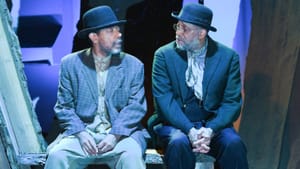Stay in the Loop
BSR publishes on a weekly schedule, with an email newsletter every Wednesday and Thursday morning. There’s no paywall, and subscribing is always free.
Worth the wait
Quintessence Theatre Group presents Samuel Beckett's 'Waiting for Godot'

Spoiler alert: He still doesn’t show. But little else in Quintessence Theatre Group’s simply brilliant new production of Waiting for Godot will likely conform to anyone’s preconceived notions of Samuel Beckett’s oft-revived, discussed-to-death classic. This fresh, invigorating take benefits from a much-needed dose of humanity, stripping away the archness and artifice of Beckett’s meditation on the futility of life.
As embodied under Ken Marini’s direction by astonishing performances from Frank X and Johnnie Hobbs Jr., Beckett’s tramps feel less like clowns than ever before. Their dirty faces and tattered clothes (by Jane Casanave) suggest palpable desperation rather than cutesy contrivance. The opening image of Estragon (X) struggling mightily to remove his soiled, stinking boot provokes a gasp, not a laugh.
But bound up in this veristic portrait of two anguished men on the fringes of society is a real sense of affection. When Vladimir (Hobbs) instructs Estragon to “get up till I embrace you,” you won’t doubt for a moment how much he wants — or needs — that hug.
Between the wars
Marini and his design team, which also includes James F. Pyne Jr. (set) and John Burkland (lighting), evoke the harrowing landscape of the Great Depression. Several reference points in the text were changed from France to California to make the point plain. The young boy (Lyam David-Kilker) who acts as Godot’s messenger resembles a Little Rascals cast member in his shabby vest and newsboy cap.
Didi and Gogo, as they’re called, still mention joining hands at the top of the Eiffel Tower, but now, at their lowest moment, they pick grapes in the Napa Valley. This reference subtly suggests the sad fate of two soldiers 20 years out from World War I: they saw the lights of Paris, but now they don’t even have a farm to be kept down on.
The hardscrabble homeless existence portrayed here draws the familiar characters into sharper focus than I’ve ever seen. The traits that have defined X as an actor throughout his career — a supremely noble bearing, wondrous elocution, and plenty of charm — here seem appropriately performative. He holds on to his identity by carrying himself with grace, even at his lowest moments.
The warmly sympathetic Hobbs shows how Didi acts as guardian and protector to his more fragile friend. Marini compares the rhythm of the play to jazz in a program note, and that sense of gorgeous spontaneity infuses their line readings.
Fresh perspective
The strong rapport between X and Hobbs may also contribute to the production’s sole misstep. In other stagings, the play tends to wake up with the arrival of pompous Pozzo (Gregory Isaac) and his dehumanized slave Lucky (J Hernandez). Here, their presence comes across primarily as an interruption.
This largely stems from a strange conception of Pozzo’s purpose. He is a lord of misrule, a mercurial and dangerous figure, upending any tenuous hope the tramps might have for tranquility and resolution. But as played by the talented, miscast Isaac — whose matinee-idol looks and honeyed voice set the wrong tone — his temperament is surprisingly benign.
Without a sense of fire in the first act, his second-act pronouncement that “they give birth astride a grave, the light gleams an instant, and then it’s night once more” neither shocks nor scares. (I have nothing but praise for Hernandez, who fills Lucky’s oratory with divine gravitas and manages to be interesting even when lying prone).
The production finds its footing again when X and Hobbs reclaim center stage and drive the play to its familiar yet shattering denouement. Once again, moments that might have drawn humor in the past — like the agonizing suicide attempt foiled by a too-short belt — instead deliver chills.
Quintessence was founded with a noble goal: presenting fresh perspectives of classic plays. That mandate has been mightily achieved here. You’re likely to leave this Godot feeling like you’ve seen an old masterpiece through new eyes — and isn’t that why we go to the theater in the first place?
What, When, Where
Waiting for Godot. By Samuel Beckett, Ken Marini directed. Quintessence Theatre Group. Through February 18, 2018, at the Sedgwick Theater, 7137 Germantown Avenue, Philadelphia. (215) 987-4450 or quintessencetheatre.org.
Sign up for our newsletter
All of the week's new articles, all in one place. Sign up for the free weekly BSR newsletters, and don't miss a conversation.
 Cameron Kelsall
Cameron Kelsall